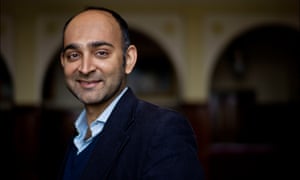What makes a Man Booker novel?
Mohsin Hamid on Exit West
Mohsin Hamid on Exit West
Ahead of the announcement of the 2017 prize next week, the stories behind the stories
Saturday 14 October 2017 08.00 BST
Mohsin Hamid on Exit West

Mohsin Hamid. Photograph: Sarah Lee for the Guardian
I was born in Lahore, and I live in Lahore, but I’m a mongrel through and through. Some of us look like mongrels. We’ll have eyes that people think belong to one continent, and hair they think belongs to another. Some of us are mongrels inside. We’re mongrels in ways that might not be obvious from a photograph. We’re mongrels in how we muse, how we speak, what we believe, who we are. I’m that second type of mongrel. I’ve lived on both coasts of the Pacific and the Atlantic and far up the Asian land mass alongside an empty river that once flowed down to the Indian Ocean via the Arabian Sea.
It’s a frightening time for mongrels. Purity seems to be all the rage. In a rage. We see, once again, the rise of openly expressed white supremacy in America. We see growing anti-migrant sentiment in Europe, growing anti-Muslim sentiment in India, growing chauvinism in China, Turkey, Myanmar. And in Pakistan, quite literally the “land of the pure”, where I live, we see a murderous attachment to purity so pronounced that no human being is pure enough to be safe.
Sometimes I feel a sense of impending apocalypse. Driving home with my children or lying in bed with my wife, I imagine that our ancient city might go the way of those other ancient cities that straddle the hinge between Asia, Europe and Africa – the cities we read about in our newspapers and watch on our screens. I imagine a bloodbath. I imagine fleeing. I imagine leaving loved ones behind. I don’t think this will happen. I think it is unlikely. But the fear is often with me, like swimming in the ocean, as a child, after having watched Jaws.
Exit West grew out of that fear. I needed to explore the worst, and I needed also to find hope. I am a father, and so hope is no longer a luxury for me, it is the most fundamental requirement of my job.
The novel is not autobiographical, in the sense that it is not the story of the events of my life. And yet, as I wrote it, I saw autobiographical elements creeping in. It is geographically autobiographical, in that I have lived in a city like the nameless city of Nadia and Saeed, and also in London, where they flee, and also in the San Francisco Bay Area, where they flee later, and I have spent time in Tijuana and Rio de Janeiro and Tokyo and all the other places in which characters in the novel suddenly appear. These locations are not present by chance. They have mattered to me. They are locations that have mattered to my life.
And feelings in the novel seem close to my feelings, to my recollections of love, and especially first love, to my thoughts about getting older, of watching my children grow, of recognising the differences in the arcs of our lives, and to understanding my parents, who live next door, differently as a result.
As a mongrel, I once thought I was unlike other people. But I have come to realise that everyone is a mongrel. Hybridity is at the core of humanity. It is our nature. We do not divide, like some single-celled organism, into further identical human beings. We commingle the genetic material of two different people to create a child. When we wage wars against mongrels, wars for purity, we attack what makes us human. We attack ourselves.
As I wrote Exit West, I found the language changing as the chapters progressed. The sentences grew longer, became more incantatory, like a magic spell. Like a prayer. Which seemed fitting to me. We write what we most need.
Exit West is published by Hamish Hamilton.




No comments:
Post a Comment